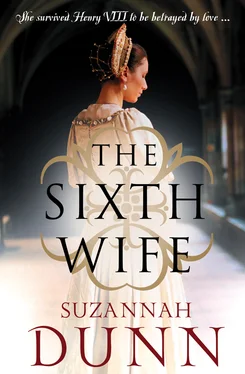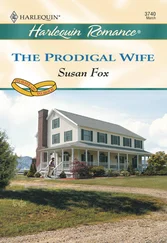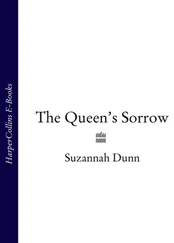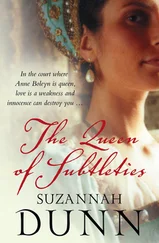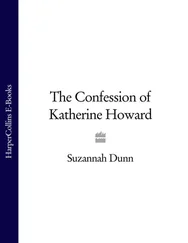‘Oh -’ She waved a hand, dismissive, weary. ‘I wasn’t totally alone. Anne knew, of course. And because Anne knew, Will knew.’
Of course, of course: Anne, Will, her sister and brother. Family. A family which had then done very nicely from the royal marriage. As families always do. Don’t misunderstand me, I like Anne, Kate’s sister, very much;Will, too, but particularly Anne: we’re good friends. There’s no denying, though, that she and Will stood to do very well from Kate’s marriage to Henry. They were hardly impartial advisors.
‘I had to do it,’ Kate was saying, ‘and so I did do it, and I think I did it very well.’
No question of that. ‘You did.’ Her motto, I remembered: To be useful in all I do . Useful to her family in this case certainly.
I cut in: ‘Does she – Anne – know now?’ Of this marriage to Thomas.
Kate nodded, a by-the-by nod.
‘And Will.’ It wasn’t a question, I already knew the answer, and indeed she didn’t bother to confirm or deny it.
‘I wish you’d told me.’
‘I did,’ she tried.
That was disingenuous of her; I gave her a look.
She relented a little. ‘You’re busy, Kate; you’ve the boys.’
I didn’t relinquish that look.
‘I couldn’t have burdened you.’
‘Oh -’ Exasperation: words failed me.
‘And you…you tend to talk me round.’ She tried a smile.
‘Yes, and perhaps that’s why you should tell me what you’re up to.’
I wasn’t sure what had just been said; I wasn’t sure, all of a sudden, where we were with this. Except that we were on uncertain ground.
‘You scare people, you know, Cathy.’ She was careful to make it sound good-humoured.
I rolled my eyes: That’s nonsense, that’s ridiculous . ‘Everyone knows that’s just me.’ I speak my mind and I don’t give an inch. ‘The only people I frighten are the ones who deserve it,’ I said. ‘I don’t frighten you’
She smiled; her knowing smile, the mysterious, infuriating one that she favoured when declining to go on, when putting a stop to something. I found her towel, handed it to her. Listen: the truth is that no one ever scared Kate, even if it suited her on this occasion to think otherwise.

As best friends, Kate and I went back further than we could ever even know, to before we were born. Our mothers were very close friends. They came of age under the influence of the formidable queen Margaret Beaufort and the sparkling new Spanish one, and I’d often imagine their optimism as they came together over their books and in their debates and discussions, just as we, their daughters, were later doing. In our case, they were different books and ideas – our good catholic mothers would have turned in their graves if they knew – but they were books and ideas nonetheless. Excitement at the prospect that something of the world was understandable, if not open to change: that’s what we shared with our mothers. The discovery that there was a better life to be lived. For women. I have a feeling that our mothers would have often said to each other, Everything is different now; everything is possible .
For women , was what they would have meant, because Margaret Beaufort and Catherine of Aragon were women who were serious about women. One of them had seen her generation of women run the estates while the men fought the Wars of the Roses; the other had witnessed her mother reign superbly in her own right.
It’s what Kate and I were saying a generation later – Everything’s different now for women - and we considered ourselves onto something new. But, then, women had had a setback, we’d come through difficult times and so we were, in a way, having to start all over again. What I recalled of Kate’s mother Maud was an expression that implied she’d seen it all and was expecting worse, but I doubt she could have imagined just how bad the Anne Boleyn years would be. The locking away of one queen and then the execution of the next. No matter that Catherine was queen, the highest of all women in the land, or, moreover, that she was a good queen, then a fierce queen, fighting for her principles and the rights of her daughter. In the end, she was just a woman, meaning just a burden on a man, no longer pretty and not up to bearing a son. And then, in Anne Boleyn’s world, at Anne Boleyn’s court, there was room for only one woman, and no prizes for guessing whom. That was when most of us – women – slunk away into quiet lives, family lives. Then came Anne’s arrest, and suddenly the woman who was above all other women was – officially – fickle, malicious, bewitching. No doubt about it: Kate and I became women at a time when women were seen as trouble.
Maud belonged, despite that heavy-weather expression of hers, to more optimistic times. It was my mother, the optimist, who lived on to face what was, for her, the end of the world: the Reformation. My mother was a foreigner. She’d come here with the Spanish queen-to-be, Catherine of Aragon, as chief hand-holder. She was Maria de Salinas in those days. Mary Salts to you. Married, Anglicised, she turned into Mary Willoughby. Maria de Salinas, the funny, clever Spaniard, was before my time, but nor did I ever really know the Mary Willoughby who had one of the king’s ships named in her honour. Because that Mary was, by all accounts, carefree, a lover of life. Back in those days, the king had done more than name a ship after his favoured Spaniard: he found her a husband, a good one. And then she had me. And then everything went wrong: England went mad, in my mother’s view, and she followed Catherine into exile, to various tumbledown, far-flung castles. She could have seen it as her duty, even if the hand-holding days had officially long passed, but it was so much more than that, and I’m not sure I have a word for it.‘Friendship’ hardly does it justice: hardly explains leaving one’s family, one’s little girl, for ever, for a banished, tormented queen. Catherine died in my mother’s arms and now my mother is buried alongside her. It was what she wanted, Catherine’s tomb prised open for her when the time came. Two Spanish girls, Maria and Catalina, side by side in Peterborough.
Ten

It was summer when I next saw Kate. A couple of months had slipped by and suddenly it was June or July, I don’t remember which. Strawberry season. She would have been married for six months or so and she looked better than I’d ever seen her – luminous – but there was desperation in her hug when she greeted me.
‘What is it?’ I was worried. ‘What’s the matter?’ ‘Oh, it’s nothing,’ the agitated tone making clear it was anything but. ‘Really nothing.’
Thomas: that was my first thought. Here we go, honeymoon over. He’s done something, shown his true colours. I tingled at the prospect of vindication. We were in the hall, surrounded by my boxes. The featherbed drivers were at work that morning, in the bedrooms, beating the mattresses, driving fresh air through all those feathers. So, I was temporarily displaced even before I’d properly arrived. One of my leather-covered wooden trunks doubled as a bench for us; we perched side by side. We were alone, Bella having been sent to pick flowers and herbs for my room.
‘It’s just…’ Kate closed her eyes, hard, then opened them and stared at me, indignant. ‘Anne Stanhope.’ Ed Seymour’s wife. ‘Has Ed said anything to you?’
‘Oh, he knows better than to mention her to me.’ Not Thomas, then. Not this time. Oh, well.
Читать дальше
